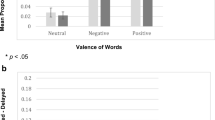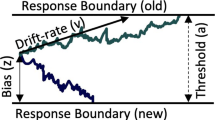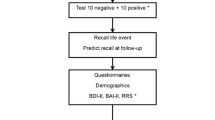Abstract
This study investigated differences in depressed and nondepressed children's recall of positively and negatively reinforced behavior. Twenty-six children with self-reported symptoms of depression in the fourth through sixth grades were compared with a matched sample of 26 nondepressed children to determine if there was a negative bias in depressed children's recall. Subjects first generated guesses of the most common associations to each of a series of 40 words. Later, when compared with their nondepressed peers, the children with depressive symptomology were less accurate in recalling which words they had answered correctly and remembered fewer of their own correct responses. They also did more poorly when asked to recall the correct answers that had been provided by the investigator. The two groups did not differ, however, in their recall of which items had been answered incorrectly or in their recall of their previous wrong responses. These results suggest that children with self-reported depressive symptomology do not remember negative experiences more than do nondepressed children; rather, they recall positive experiences less well. Selective forgetting of positively reinforced behavior could be a serious handicap for depressed children in school. It could also play an important role in the maintenance and perhaps even the etiology of depressive symptomatology in children.
Similar content being viewed by others
References
Blaney, P. H. (1986). Affect and memory: A review.Psychological Bulletin, 99, 229–246.
Blumberg, S. H., & Izard, C. E. (1985). Affective and cognitive characteristics of depression in 10- and 11-year-old children.Journal of Personality and Social Psychology, 49, 194–202.
Bradley, B., & Mathews, A. (1983). Negative self schemata in clinical depression.British Journal of Clinical Psychology, 22, 173–181.
Buchwald, A. M. (1977). Depressive mood and estimates of reinforcement frequency.Journal of Abnormal Psychology, 86, 443–446.
Cicchetti, D., & Schneider-Rosen, K. (1986). An organizational approach to childhood depression. In M. Rutter, C. E. Izard, & P. B. Read (Eds.),Depression in young people. Clinical and developmental perspectives, (pp. 71–134). New York: Guilford Press.
Craighead, W. E., Hickey, K. S., & DeMonbreun, B. G. (1979). Distortion of perception and recall of neutral feedback in depression.Cognitive Therapy and Research, 3, 291–298.
DeMonbreun, B. G., & Craighead, W. E. (1977). Distortion of perception and recall of positive and neutral feedback in depression.Cognitive Therapy and Research, 1, 311–329.
Dobson, K. S., & Shaw, B. F. (1981). The effects of self-correction on cognitive distortions in depression.Cognitive Therapy and Research, 5, 391–403.
Dunbar, G. C., & Lishman, W. A. (1984). Depression, recognition-memory and hedonic tone. A signal detection analysis.British Journal of Psychiatry, 44, 376–382.
Fielstein, E., Klein, M. A., Fischer, M., Hanan, C., Koburger, P., Schneider, M. A., & Leitenberg, H. (1985). Self-esteem and causal attributions for success and failure in children.Cognitive Therapy and Research, 9, 381–398.
Finch, A. J., Jr., Saylor, C. F., & Edwards, G. L. (1985). Children's Depression Inventory: Sex and grade norms for normal children.Journal of Consulting and Clinical Psychology, 53, 424–425.
Fischer, M., & Leitenberg, H. (1986). Optimism and pessimism in elementary school-aged children.Child Development, 57, 241–248.
Friedman, R., & Butler, L. F. (1979).Development and evaluation of a test battery to assess childhood depression. Unpublished manuscript, Ontario Institute for Studies in Education.
Gotlib, I. H. (1981). Self-reinforcement and recall. Differential deficits in depressed and nondepressed psychiatric patients.Journal of Abnormal Psychology, 90, 521–420.
Gotlib, I. H. (1983). Perception and recall of interpersonal feedback: Negative bias in depression.Cognitive Therapy and Research, 7, 399–412.
Haley, G. M., Fine, S., Marriage, K., Morretti, M. M., & Freeman, R. J. (1985). Cognitive bias and depression in psychiatrically disturbed children and adolescents.Journal of Consulting and Clinical Psychology, 53, 533–537.
Hammen, C., & Zupan, B. A. (1984). Self-schemas, depression, and the processing of personal information in children.Journal of Experimental Child Psychology, 37, 598–608.
Helsel, W. J., & Matson, J. L. (1984). The assessment of depression in children: The internal structure of the Child Depression Inventory (CDI).Behaviour Research and Therapy, 22, 289–298.
Johnson, J. E., Petzel, T. P., Hartney, L. M., & Morgan, R. A. (1983). Recall of importance ratings of completed and uncompleted tasks as a function of depression.Cognitive Therapy and Research, 7, 51–56.
Johnson, M. H., & Magaro, P. A. (1987). Effects of mood and severity on memory processes in depression and mania.Psychological Bulletin, 101, 28–40.
Kashani, J., Husain, A., Shekim, W., Hodges, K., Cytryn, L., & McKnew, D. (1981). Current perspectives on childhood depression: An overview.American Journal of Psychiatry, 138, 143–153.
Kaslow, N. J., Rehm, L. P., & Siegel, A. W. (1984). Social-cognitive and cognitive correlates of depression in children.Journal of Abnormal Child Psychology, 12, 605–620.
Kazdin, A. E., Colbus, D., & Rodgers, A. (1986). Assessment of depression and diagnosis of depressive disorder among psychiatrically disturbed children.Journal of Abnormal Psychology, 4, 499–515.
Kazdin, A. E., French, N. H., Unis, A. S., Esveldt-Dawson, K., & Sherick, R. B. (1983). Hopelessness, depression, and suicidal intent among psychiatrically disturbed inpatient children.Journal of Consulting and Clinical Psychology, 51, 504–510.
Kovacs, M. (1980 /1981). Rating scales to assess depression in school-aged children.Acta Paedopsychiatrica, 46, 305–315.
Kovacs, M., & Beck, A. T. (1977). An empirical-clinical approach toward a definition of childhood depression. In J. Schulterbrandt & A. Raskin (Eds.),Depression in childhood: Diagnosis, treatment, and conceptual models (pp. 1–25). New York: Raven Press.
Kuiper, N. A., & Derry, P. A. (1982). Depressed and nondepressed content self-reference in mild depressives.Journal of Personality, 50, 67–80.
Lefkowitz, M. M., & Tesing, E. D. (1985). Depression in children: Prevalence and correlates.Journal of Consulting and Clinical Psychology, 53, 657–656.
Leitenberg, H., Yost, L. W., & Carroll-Wilson, M. (1986). Negative cognitive errors in children: Questionnaire development, normative data, and comparisons between children with and without self-reported symptoms of depression, low self-esteem, and evaluation anxiety.Journal of Consulting and Clinical Psychology, 54, 528–536.
Leon, G. R., Kendall, P. C., & Garber, J. (1980). Depression in children: Parent, teacher, and child perspectives.Journal of Abnormal Child Psychology, 8, 221–235.
Lewinsohn, P. M., & Rosenbaum, M. (1987). Recall of parental behavior by acute depressives, remitted depressives, and nondepressives.Journal of Personality and Social Psychology, 52, 611–619.
Lloyd, G. G., & Lishman, W. A. (1975). Effect of depression on the speed of recall of pleasant and unpleasant experiences.Psychological Medicine, 5, 172–180.
Malmquist, C. (1976). The theoretical status of depressions in childhood. In E. J. Anthony & D. C. Gilpin (Eds.),Three clinical faces of childhood. New York: Spectrum.
McDowall, J. (1984). Recall of pleasant and unpleasant words in depressed subjects.Journal of Abnormal Psychology, 93, 401–407.
Moyal, B. R. (1977). Locus of control, self-esteem, stimulus appraisal, and depressive symptoms in children.Journal of Consulting and Clinical Psychology, 45, 951–952.
Nelson, R. E., & Craighead, W. F. (1977). Selective recall of positive and negative feedback, self-control behaviors, and depression.Journal of Abnormal Psychology, 86, 379–388.
Nolan-Hoeksema, S., Girgus, J. S., & Seligman, M. E. P. (1986). Learned helplessness in children: A longitudinal study of depression, achievement, and exploratory style.Journal of Personality and Social Psychology, 51, 435–452.
Palermo, D. S., & Jenkins, J. J. (1965).Word association norms. Minneapolis: University of Minnesota Press.
Reynolds, W. M., Anderson, G., & Bartell, N. (1985). Measuring depression in children: A multimethod assessment investigation.Journal of Abnormal Psychology, 13, 513–526.
Rutter, M. (1986). The developmental psychopathology of depression: Issues and perspectives. In M. Rutter, C. E. Izard, & P. B. Read (Eds.),Depression in young people: Clinical and developmental perspectives (pp. 3–30). New York: Guilford Press.
Rutter, M., Izard, C. E., & Read, P. B. (Eds.). (1986).Depression in young people: Clinical and developmental perspectives. New York: Guilford Press.
Saylor, C. F., Finch, A. J., Jr., Spirito, A., & Bennet, B. (1984). The Children's Depression Inventory: A systematic evaluation of psychometric properties.Journal of Consulting and Clinical Psychology, 52, 955–967.
Seligman, M. E. P., Kaslow, N. J., Alloy, L. B., Peterson, C., Tanenbaum, R. L., & Abramson, L. Y. (1984). Attributional style and depressive symptoms among children.Journal of Abnormal Psychology, 93, 235–238.
Smucker, M. R., Craighead, W. E., Craighead, L. W., & Green, B. J. (1986). Normative and reliability data for the Children's Depression Inventory.Journal of Abnormal Psychology, 14, 25–39.
Wener, A. E., & Rehm, L. P. (1975). Depression affect: A test of behavioral hypotheses.Journal of Abnormal Psychology, 84, 221–227.
Author information
Authors and Affiliations
Additional information
We wish to thank Bruce Compas for his helpful comments on an earlier draft of this paper.
Rights and permissions
About this article
Cite this article
Whitman, P.B., Leitenberg, H. Negatively biased recall in children with self-reported symptoms of depression. J Abnorm Child Psychol 18, 15–27 (1990). https://doi.org/10.1007/BF00919453
Revised:
Issue Date:
DOI: https://doi.org/10.1007/BF00919453




